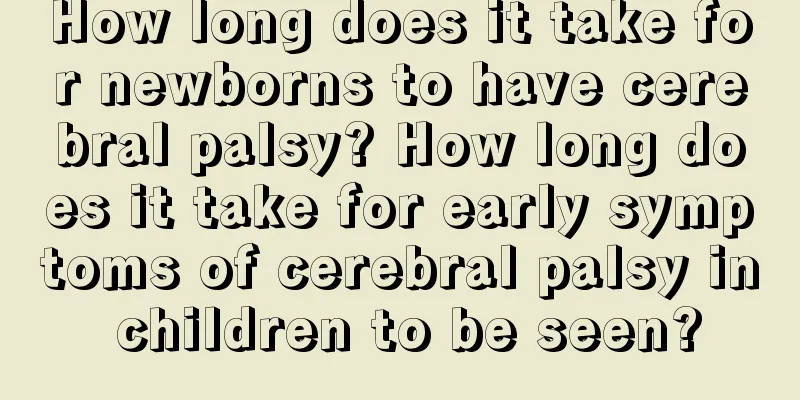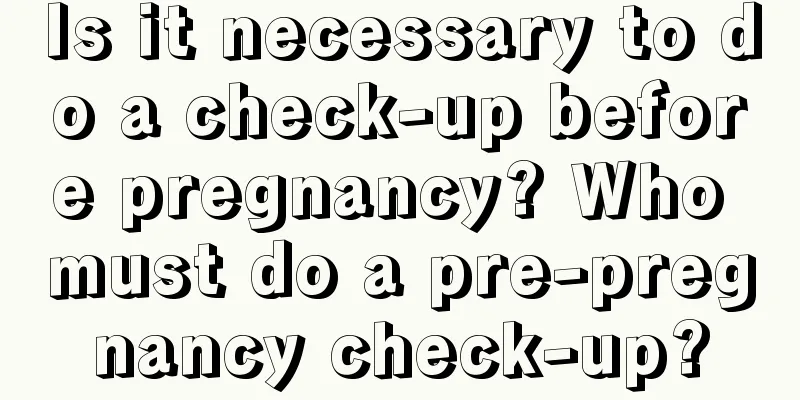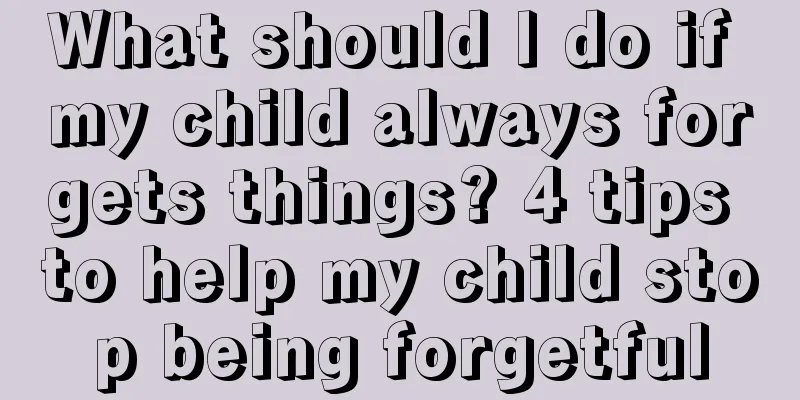How long does it take for newborns to have cerebral palsy? How long does it take for early symptoms of cerebral palsy in children to be seen?

|
Cerebral palsy refers to cerebral palsy. The causes of cerebral palsy are relatively complicated and are generally divided into hereditary and acquired. Once a child has cerebral palsy, he or she may have abnormal body posture, limb dysfunction, and varying degrees of language and intellectual disabilities. How long does it take for cerebral palsy to be seen in newborns?The early symptoms of neonatal cerebral palsy are generally that the child is still inactive and unmovable 3 months after birth, and the hands and feet do not crawl when lying prone. The child shows no interest in anything around him, has poor responsiveness, and has significantly reduced movements. Even the sucking ability is very poor, and he often chokes on milk, which is very likely a manifestation of cerebral palsy. Early symptoms of cerebral palsy in children1. Newborns or three-month-old babies are easily frightened, cry incessantly, refuse to drink milk, and have difficulty sleeping. 2. Difficulties in early feeding, chewing, drinking, swallowing, drooling, and breathing disorders. 3. Low sensory threshold, manifested as being easily startled by noise or changes in body position, and having an enhanced hugging reflex accompanied by crying. 4. Normal infants shortly after birth may step alternately with their feet when standing upright due to the stepping reflex. Although this may disappear at 3 months old, if there is still no standing or stepping at 3 months old, cerebral palsy should be suspected. 5. Babies over 100 days old are still unable to lift their heads, and their heads still shake when they straighten their backs at 4 to 5 months. 6. Fist clenching: Generally, babies can clench their fists but not open them within 3 months after birth. If the thumb is still adducted and the hand cannot be opened at 4 months, cerebral palsy should be suspected. 7. A normal baby should be able to reach out and grab objects when seeing them between 3 and 5 months old. If he still cannot do so after 5 months, he is suspected of having cerebral palsy. 8. Generally, they will smile 4 to 6 weeks after birth and recognize people later. Children with spastic cerebral palsy have a dull expression, while those with athetoid cerebral palsy often look sad. 9. The muscles are soft and unable to turn over, and the movements are slow. When touching the inner thigh of the child, or letting the child's feet rest on the bed or jump up and down, the lower limbs are stretched and crossed. 10. Stiffness, especially when dressing, it is difficult to put the upper limbs into the cuffs; when changing diapers and washing, the thighs are not easy to extend; when wiping the palms and bathing, the limbs are stiff. The baby does not like to take a bath. What are the symptoms of cerebral palsy babies feeding?Babies with cerebral palsy are prone to choking when drinking milk and spitting up milk when drinking. Babies cannot drink much milk, so they are very anxious and irritable. The process of drinking milk is always accompanied by crying, and it is difficult to burp after drinking milk. Therefore, if the baby always spits up, chokes, and does not drink much milk, it is necessary to detect whether the child has cerebral palsy. Send the child to the hospital for examination in time. If there is really a problem, early intervention will be good for the child. What causes cerebral palsy in babies?There are many causes of cerebral palsy. Most of them are hereditary cerebral palsy, because the baby's head is squeezed during delivery. Women with high blood pressure during pregnancy can also cause cerebral palsy in babies after birth. It is also possible that after a woman gives birth, the baby is infected by foreign bacteria, causing brain inflammation and cerebral palsy. It is easy to find out if a baby has cerebral palsy. Observe the baby's usual condition, such as the baby's dull eyes, no crying, and unclear mind. |
<<: What should I do if my baby always wakes up during sleep? How to improve my baby's sleep
Recommend
Why do children always go against their parents? What should we do if children deliberately go against their parents?
Children today are the apple of their parents'...
Do I need a birth permit for my second child? Do I need a birth permit for my second child?
Many parents who are having a second child don’t ...
How to educate children who disrespect their parents during their rebellious period?
Usually, many children will have rebellious thoug...
Can babies drink fresh milk? At what age can they drink milk?
Milk is rich in calcium and other nutrients, whic...
How much Ariel laundry detergent should be used at a time? Does Ariel laundry detergent have the effect of removing mites?
Nowadays, laundry detergent is often used for was...
What are the benefits of swimming for babies? What are the benefits of swimming for babies?
Scientific swimming is an exercise that is benefi...
How long is the best time to breastfeed your baby?
Generally, newborns are breastfed after birth, an...
Will taking Tianxi Pills always result in a boy? Will taking Tianxi Pills result in a boy?
Tianxi Pills are a medicine that many mothers who...
How to care for your baby's fontanelle? When will your baby's fontanelle close?
The fontanelle grows on the baby's head and i...
Do children need to be on an empty stomach when taking sugar pills? How to take sugar pills
In order to enhance children's immunity, babi...
The correct posture for washing your baby's hair Steps for washing your baby's hair
The question of how to wash a baby's hair has...
What are the symptoms of heat stroke in babies? How to judge whether babies have heat stroke in summer?
When babies are very young, they cannot express t...
Why does my 12-year-old child often wet the bed? How to treat it?
The child is already 12 years old, and the mother...
Prediction table for the gender of the second child. Know the gender of the second child in advance.
In fact, it is natural to have a boy or girl. As ...
What medicine can reduce neonatal jaundice? What medicine is effective for neonatal jaundice?
The baby was born not long ago, and he has develo...









